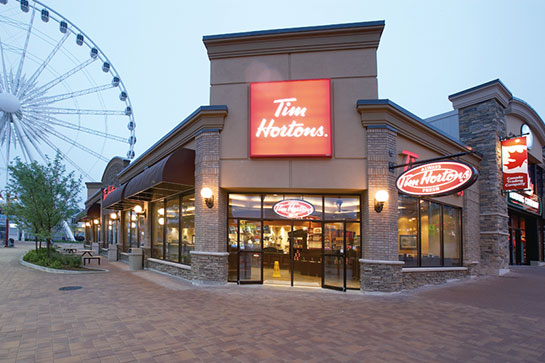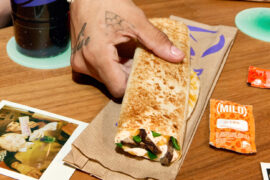After several days of speculation in financial circles and among the business press, an agreement was reached on August 26 to create the world’s third largest quick service restaurant (QSR) company, as Tim Hortons Inc. and Burger King Worldwide Inc. announced a merger valued at $12.5 billion. With approximately $23 billion in systemwide sales, over 18,000 restaurants in 100 countries and two independent brands, the combined company will have an extensive international footprint and significant growth potential.
Executives from Oakville, Ontario, Canada-headquartered Tim Hortons and Miami, Florida-based Burger King have vowed that each brand will continue to be managed independently, while collectively benefitting from global scale and reach and sharing of best practices that will come with common ownership by the new company.
Although Burger King has roughly twice as many locations as Tim Hortons, the Canadian chain reportedly generates more revenue from its stores. It market share of QSR sales in Canada is 28%.
Brazilian investment firm 3G Capital, the majority owner of Burger King, will control the majority of shares of the new company on a pro forma basis, with the remainder held by existing shareholders of Tim Hortons and Burger King.

Under terms of the transaction, which has been unanimously approved by the boards of directors of both companies, Tim Hortons shareholders will receive C$65.50 in cash and 0.8025 common shares of the new company per Tim Hortons share. Based on Burger King’s unaffected closing stock price as of August 22, 2014, this represents total value per Tim Hortons share of C$89.32 and based on Burger King’s closing stock price as of August 25, 2014, this represents total value per Tim Hortons share of C$94.05. As an alternative to the default mixed transaction consideration described above, each Tim Hortons shareholder will have the option to instead receive, for each Tim Hortons share held, either C$88.50 in cash; or 3.0879 common shares of the new company, in each case subject to pro ration.
The C$89.32 unaffected offer value represents a premium of 39% based on the volume weighted average price of Tim Hortons stock over the past 30 days ending August 22, 2014, and a 30% premium based on Tim Hortons closing stock price on August 22, 2014. By receiving shares in the new parent company, Tim Hortons’ shareholders will have the opportunity to participate in the new company’s long-term value creation potential.
Financial Arrangements
Burger King has obtained commitments for $12.5 billion of financing to fund the cash portion of the transaction, including commitments for a $9.5 billion debt financing package led by JP Morgan and Wells Fargo. The obligation of JP Morgan and Wells Fargo to provide this committed debt financing is subject to a number of customary conditions, including execution and delivery of certain definitive documentation. It is expected that the debt financing for the transaction will consist of a $6.75 billion senior secured term loan B facility, a $500 million senior secured revolving credit facility and senior secured second-lien notes in the amount of $2.25 billion.
Warren Buffet’s Berkshire Hathaway Inc. has committed $3 billion of preferred equity financing. It is simply a financing source and will not have any participation in the management and operation of the business.
The transaction is subject to customary closing conditions, including approval of Tim Hortons shareholders and receipt of certain antitrust and regulatory approvals in Canada and the US. Since 3G Capital already owns approximately 70% of the shares of Burger King and has committed to vote in favor of the combination, no shareholder vote is required of Burger King shareholders.
Management and Governance
At the time of closing, Alex Behring, executive chairman of Burger King and managing partner at 3G Capital, will lead the new global company as executive chairman and director. Marc Caira, president and ceo of Tim Hortons, will be appointed as vice chairman and director, focused on overall group strategy and global business development. Daniel Schwartz, ceo of Burger King, will become group ceo of the new company, with overall day-to-day management and operational accountability. The new organization’s board will include the current eight Burger King directors and three directors to be appointed by Tim Hortons, including Caira.
Caira and Schwartz will continue as Tim Hortons and Burger King chief executive officers, respectively, through the transition period, and additional executives in the new global company structure will be identified from Burger King and Tim Hortons during the transition and announced at the time of closing.
The current Tim Hortons headquarters in Oakville, Ontario, will continue to be the global home of the Tim Hortons business. Burger King’s current headquarters in Miami, Florida, will remain as the global home of the Burger King business. It is expected that the shares of the new parent company will be listed on the New York Stock Exchange and the Toronto Stock Exchange.
Tim Hortons Overview
Tim Hortons Inc., co-founded in 1964 by ice hockey star Tim Horton, is one of the largest publicly traded restaurant chains in North America based on market capitalization, and the largest in Canada. Operating in the quick service segment of the restaurant industry, it appeals to a broad range of consumer tastes, with a menu that includes premium coffee, hot and cold specialty drinks (including lattes, cappuccinos and espresso shots), specialty teas and fruit smoothies, fresh baked goods, grilled Panini and classic sandwiches, wraps, soups, prepared foods and other products. As of June 29, 2014, the company had 4,546 systemwide restaurants, including 3,630 in Canada, 866 in the United States and 50 in the Gulf Cooperation Council member states.
About Burger King
Founded in 1954, Burger King is the second largest fast food hamburger chain in the world. The system operates in over 13,000 locations serving more than 11 million guests daily in 98 countries and territories. Almost 100% it restaurants are owned and operated by independent franchisees, many of them family enterprises that have been in business for decades.





